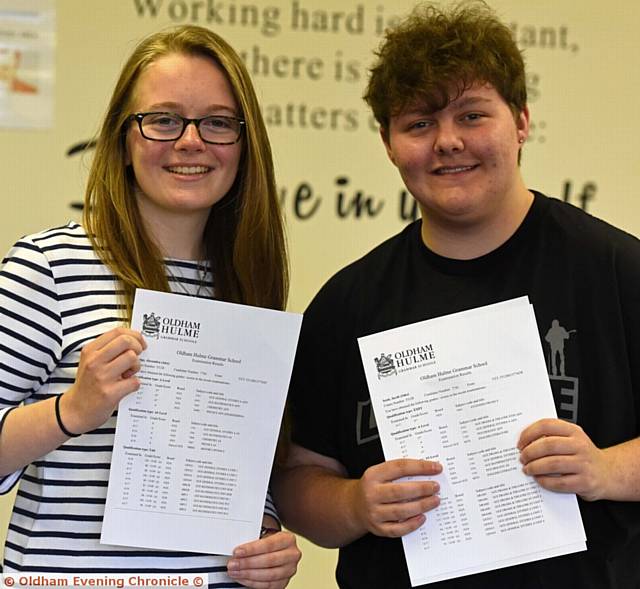Students make the grade in a year of challenge
Reporter: Richard Hooton
Date published: 17 August 2017

DELIGHT . . . Hulme Grammar School students Alexandra Sledge (3A* and 1A) and Jake Scott (3A* and 2A)
THE WAIT was over for teenagers across Oldham as they ripped open envelopes to reveal their A-level results this morning with the number of top grades expected to rise.
Among those celebrating was Leah Nuttall, at Blue Coat School, who will be the first in her family to go to university after getting two A*, two As and a C in English literature, history, biology, citizenship and general studies. She is heading to Durham University to study history.
Leah said: "I'm ecstatic. I didn't expect to get the results I got. My mum started crying as I'm the first in my family to go to uni so it's a good feeling,"
Blue Coat scored a 100 per cent overall pass rate of A* to E with 9.4 per cent of those gaining A*s and 58.2 per cent A* to B.
Head teacher Julie Hollis said: "This has been a challenging year for A-level students and their teachers who have had new and tougher specifications in examinations for the first time and according to new criteria with very little sample materials to go on.
"That makes me even more proud of students' achievements this year."
Hulme Grammar School also had a 100 per cent pass rate with a record 12 per cent at A*, while 60 per cent got A* to B.
Nationally, more than one in four A-level entries scored at least an A grade this year as the proportion of exams awarded the highest results rose for the first time in six years.
Figures show that 26.3 per cent of A-level entries scored an A* or A, up 0.5 percentage points on 2016. It is the first time the A*-A pass rate has risen since 2011.
The rise comes amid major changes to the qualifications, with the first grades awarded in 13 subjects that have been reformed, with a move away from coursework and modular exams throughout the course, making them more challenging for students.
The figures, published by the Joint Council for Qualifications (JCQ), also show boys have pulled further ahead at the highest grade while girls remain ahead in terms of A*-A grades.
The statistics, for England, Wales and Northern Ireland, also show:
* The overall A*-E pass-rate has fallen by 0.2 percentage points to 97.9 per cent;
* The proportion of entries awarded the highest result - A* - has risen 0.2 percentage points to 8.3 per cent;
* Among the 13 reformed subjects only, results are down slightly compared to the equivalent subjects in 2016;
* When comparing 18-year-old results, the proportion of A* grades for these courses is down 0.5 percentage points to 7.2 per cent, A*-A grades have dropped 0.7 percentage points to 24.3 per cent and A*-E results have fallen 0.5 percentage points to 98.1 per cent.
The 13 reformed subjects are: art and design, biology, business, chemistry, computer science, economics, English language, English language and literature, English literature, history, physics, psychology and sociology.




